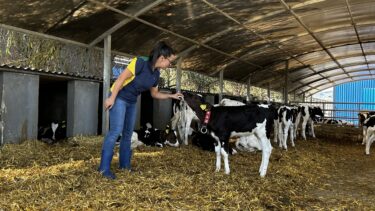Today’s newborn calf is tomorrow’s cow
In Hungary, dairy farms are currently facing serious challenges. Prolonged periods of drought have severely impacted roughage production, diminishing both its quantity and quality. This, coupled with the current market situation affects grain and milk prices. Milk purchase prices have been steadily declining. Moreover, local farms continue to face daily issues like labour shortage and other factors that hinder efficient production.
Given these challenges, dairy farms need to focus on aspects that can ensure more efficient production and better results. One of these critical factors is calf and heifer rearing as this lays the foundation for the future performance of cows. Moreover, it significantly affects factors such as the first insemination day, first calving, reproduction indicators, and a cow’s production during lactation. Most Hungarian farms recognize the importance of these periods, and so does Szarvasi-Agrota-Alcsired Kft., with whom Agrifirm Hungary has been collaborating since early 2023.
In response to a contact request from the farm, Agrifirm Hungary’s Earlyfeed experts agreed to develop a comprehensive calf rearing protocol, addressing the persistent challenge of high calve mortality rates that had been a constant concern for them. The experts meticulously devised a strategy encompassing the necessary methods and technology, aligning with the farmer’s objectives: enhancing calves’ vitality and performance by maximizing their growth potential at a young age, increasing their weight gain, all while ensuring feed costs remained affordable.
Five recommendations for colostrum and milk replacer feeding
Here are 5 recommendations for colostrum and milk replacer feeding provided by the Earlyfeed experts:
- Administer colostrum 250g IgG (Immunoglobulin G) within the first 2 hours after birth. The quantity depends on the IgG concentration, which can be checked at the farm. If measurements approve, always offer the own mother’s milk first.
- Administer colostrum with a drench set on the farm, with a feeding goal of 3 liters within the first 12 hours after birth, based on the 250g IgG goal mentioned in point 1.
- During the second day of live, feed the calves 5 liters of colostrum.
- Switch to RumiLac Comfort milk replacer from the third day onwards. Its prebiotic, probiotic, natural antioxidant, and selenium content supports the intestinal health and immunity of the calves. Farm feedback indicates that RumiLac milk replacer is well-received by the calves, easy to handle, and highly soluble.
- Include DairyStart Premium as pelleted calf starter feed during the milk feeding phase. It provides premium quality protein, carbohydrates (NFC), and highly digestible fiber, supplying the calf with the right amount of amino acids, extra vitamin E, and rumen buffer. The easily fermentable fibre components contribute to an early rumen development, ensuring good results.
Introduce calf starter feed in small quantities from day 4 to familiarize the calves with the product. Transition to ad libitum feeding from day 10. Provide fresh, clean drinking water daily, and maintain a clean drinking system or unit. Avoid feeding the calves with leftovers.
The farm’s primary objective was to achieve weaning by week 9. In preparation for this, during week 8, the experts reduced milk feedings to once a day. This gradual transition was implemented to ensure a smoother adjustment and lay the foundation for the animals’ healthy and continuous development.
After weaning, the calves were sorted into small groups according to the farm’s established technology. Over a period of at least 3-4 weeks, they were fed with premium quality hay and DairyStart Grower, a pelleted grower feed. Additionally, they have access to sufficient fresh and clean drinking water. Starting from day 90, the animals are transitioned to a special TMR (Total Mixed Ration) designed for heifers until they are eventually relocated to the heifer farm.
Farm feedback has confirmed the significant progress made during our partnership. Mortality rates have dropped by an impressive 95%, signifying a substantial improvement. Central to this success has been the establishment of trust with the farm managers. Regular on-site observations, well documented, have enabled the team to identify challenges promptly. Together with the farm manager, the Earlyfeed experts have devised practical and feasible solutions that align with the farm’s resources, avoiding substantial financial burdens.
Crucially, the dedication and enthusiasm of the farm workers play a pivotal role. Their adherence to protocols and technology is essential. At Earlyfeed, we firmly believe that our collective efforts pave the way for improvement. Collaboration is our cornerstone. We’re not just partners; we’re a team, and it’s our joint commitment that propels us forward. Together, we’re not only achieving results, but we’re setting new standards in farming excellence.
Curious to know how we can help you right from the start? Contact your local Earlyfeed expert.
This contact was suggested based on the location you are browsing from. You can of course also consult our other contacts and locations here.

